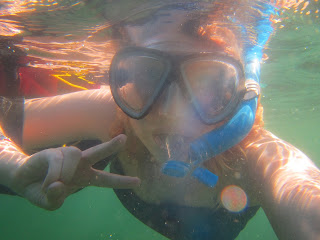Why I study garbage
So what am I doing and why on this great green blue Earth am I doing it? Why does it matter? Well, let me tell you! :D
It's no secret that plastic pollution is a problem. We see the pictures of the penguins tangled in those soda rings, or turtles caught in fishing net...we go to the beach and find plastic debris, both micro and macro, washed ashore to mingle with the sea shells and dance with our toes. Plastic pollution has certainly acquired much attention; The Ocean Cleanup project, for instance, has aims to extract plastic pollution from the ocean and "estimates to be able to clean up 50 % of the debris in the Great Pacific Garbage Patch in five years’ time..." but I will personally remain skeptical until I see an environmental assessment.
A rant for another time.
But it's important that people have begun to pay attention to the consequences of our consumerism.
So what do we know so far, and what implications can we draw from that knowledge?
Microplastics may allow the dispersal of pathogens that can pose threats to humans and marine animals. For example, Zettler et al. (2013) revealed that species of the bacteria Vibrio are frequently attached to microplastics and also demonstrated that the bacterial community in the "plastisphere" (the biofilm that encapsulates the microplastic) habitat was different from the community in the surrounding water, which suggests that plastics can potentially transport animal and human pathogens. Due to their extensive lifespan once degraded into their microplastic component (compared to organic substrates like wood) they can transport these pathogens for significant distances (Long et al. 2015), which has the potential to introduce non-native species to new environments, possibly being harmful to unexposed populations. Because these microplastics can travel such long distances, carrying with it microscopic communities, this, too, has the potential to alter marine biota as a whole by disrupting the food web.
Along with the implications microplastics can have on the health of animals and humans alike, microplastics, too, can alter the livelihoods of entire communities both economically and ecologically. Microplastics have been shown to have sub-lethal effects on animals that ingest the microplastics mistakenly for food, both by physical blockage of digestive tracts, or by release of toxic chemicals (more on this later). A decline in fish, coupled with its implied effect on the marine food web, will inherently have detrimental effects on the fishing communities in Panama by a decrease in catch revenue. Panama, in particular, is known by the fishing communities to be one of the best locations for sport fishing, which can also cascade into a decline in tourism (though it can certainly be argued that tourism is what exponentially increased plastic pollution in Bocas particularly). Due to the accumulation of microplastics along coastlines, studying the mechanisms of their degradation and removal will help assess possible methods that would reduce their abundance and impacts on both marine habitats and local socio-economic factors, not only in Panama, but around globe.




Comments
Post a Comment